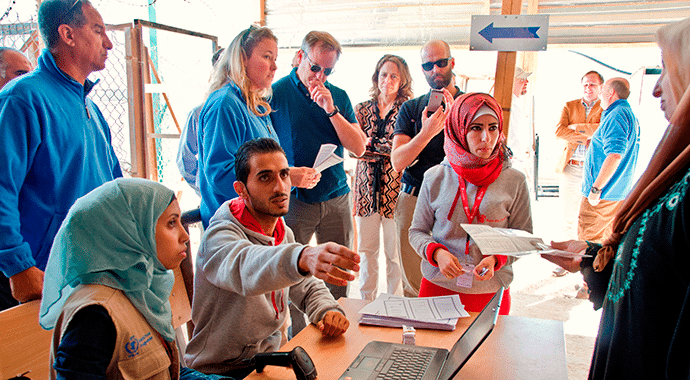
“We Simply Cannot Receive More”- Jordan Feels the Pressure of Climate-Related Refugee Crisis
On June 24, Jordanian officials announced that they would no longer accept Syrian refugees, just as the Syrian government launched a new offensive in the Daraa region of southern Syria. According to government data, Jordan has taken in over 1.3 million Syrian refugees, and on Sunday a Jordanian Minister told the Jordan Times “we simply cannot receive more.”
Jordan’s new Prime Minister, Omar Razzaz, made the official announcement on Tuesday, June 26. He added that the Syrians displaced by the latest offensive, estimated to number 45,000 by the UN, have not yet reached Jordan’s border. As for what will happen to these displaced people, Foreign Minister Ayman Safadi stated, “our borders will remain closed, and the UN can secure the population with their needs inside their country.”
Why cut off refugees now?
Jordan is no stranger to hosting refugees— hundreds of thousands of Palestinians arrived in 1948, and another wave came in 1967. Tens of thousands of Iraqis fled into Jordan during the Iraq war between 2003 and 2005, and again in 2014 when the Islamic State reached the height of its power in Mosul and the surrounding areas of Iraq.
But the Syrian influx is both larger and more concentrated than either the Palestinian or the Iraqi cases. Jordan’s finances were already stretched thin, and the cost of more refugee camps have further burdened its economy. Even with the new foreign aid, the combination of a new wave of Syrian refugees and recent economic challenges seem to have pushed Jordan to its tipping point.
Earlier this month, protests erupted across Jordan over these economic difficulties. Increases in the cost of living were driven by a variety of factors, including corruption and government overspending, but they were also blamed on the Syrian refugees.
What role does climate change play?
Jordan may say it has reached its limits regarding refugees, but the underlying trends in the Middle East only predict more migration over time. Climate change has been an important factor in exacerbating the conflicts in both Iraq and Syria, with major droughts in 2006-2010 and 2014-2015. While these were not the only factors driving instability in Syria and Iraq, they affected the people of both countries profoundly.
With water already scarce in the region, climate predictions include droughts and heat waves of increasing length and intensity, pushing more and more people away from their homes. And these droughts don’t stop once people are uprooted— refugee camps and communities hosting refugees are also affected by extreme heat and water shortages.
How will the U.S., a major stakeholder in the Syrian conflict and throughout the Middle East, respond and prepare for future responses to climate-related refugees? Jordan is the canary in the coal mine, on the front lines of multiple overlapping refugee crises, but no nation will be exempt from the effects of climate change.
What should the U.S. be doing?
America has a clear security interest in Jordan’s stability. Operation Inherent Resolve, the U.S.-led coalition campaign against IS, is primarily coordinated from Mowaffaq Salti Air Base in Jordan. Throughout the Middle East, cooperation with the Jordanian military is key to American counterterrorism efforts.
With Jordan’s border closed, the 45,000 displaced people in the Daraa region of southern Syria are left stranded. They are cut off from aid and medical treatment, in a place too dangerous for most humanitarian groups to enter. Jordan may fear instability, but the chaos of leaving tens of thousands of refugees in the desert, unaided, uncounted by any authorities, is much worse.
Refugees entering Jordan are subject to extensive background checks and interviews, while those left stranded at the border are not. If Jordan and the United States are truly committed to eradicating extremism in the region, then keeping the border both open and controlled is not only the moral decision, but the best for both nations’ security.
The U.S. must urge Jordan to keep its borders open to refugees, as Amnesty International suggests. America must fully support bilateral and multilateral efforts to ensure that the newest wave of Syrian refugees are aided and registered. And to protect our security interests in the long term, the United States needs to be planning for the effects of climate change on conflict, security, and migration worldwide.





